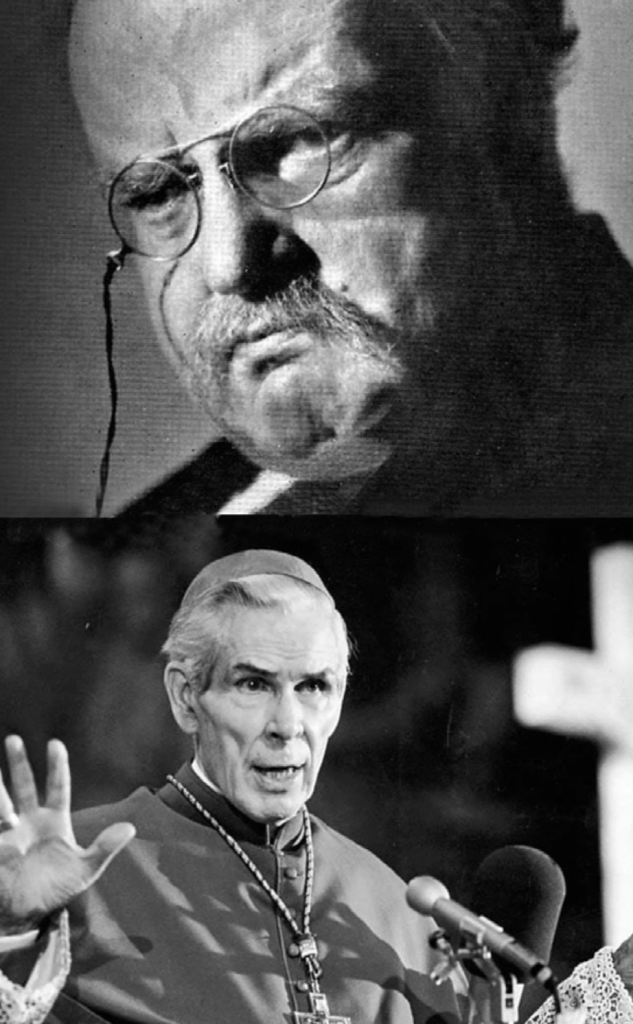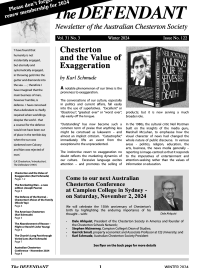A priest who pioneered radio and TV religious programs in the 1950s, Fulton J. Sheen, becoming what Time magazine called “the first televangelist”, is compared with Chesterton in the May-June 2024 issue of the St Austin Review (StAR), a Catholic cultural journal edited by Joseph Pearce.

Fulton Sheen was not only a widely popular preacher – serving for a 20th century audience the role that Bishop Robert Barron is now performing for a 21st century audience. He was also a serious scholar and a prolific author (of more than 70 books), who was deeply influenced by Chesterton.
As Joseph Tuttle remarks in his StAR article, “Literary Influences on Fulton J. Sheen,” Sheen quoted Chesterton in almost every book he wrote. In his autobiography, Treasure in Clay (1980), he acknowledged that the most significant influence on his writing had been Chesterton, “who never used a useless word, who saw the value of paradox and avoided what was trite.”
In 1925, Sheen travelled to London to meet Chesterton. In America’s Bishop: The Life and Times of Fulton J. Sheen (2001), Thomas Reeves comments:
Chesterton must have given the young American priest considerable scrutiny at their initial meeting, pondering the weight of his knowledge and the power of his intellect. While impressed, he could not know that in time Sheen would become an equally celebrated Catholic apologist, widely known in fact as ‘the American Chesterton’.
Following their first meeting, Chesterton wrote the Introduction to Sheen’s first book, God and Intelligence in Modern Philosophy (1925). It was based on Sheen’s doctoral thesis at the University of Louvain in Belgium, which he had completed before his visit to Chesterton.
In his Introduction, Chesterton argues that, in Sheen’s book, the Catholic Church “comes forward as the one and only real champion of Reason.” A century ago, Chesterton writes, there was “a school of free-thinkers which attacked Rome by an appeal to Reason. But most of the recent free-thinkers are, by their own account rather than by ours, falling from Reason even more than from Rome.”
Chesterton notes that Sheen “applies the rational as opposed to the irrational method [to] the most tremendous question in the world: perhaps the only question in the world … the nature of God in so far as it can be apprehended at
all by the nature of man.” He acknowledges Sheen’s point that “the intellectual purity of the problem itself is much confused nowadays by a sort of sentimental version of the divine dignity of man.
Chesterton thought that this supreme belief had now degenerated into a sentiment – “the dregs of our dogma about a divine origin . . . Our enemies have retreated from the territory of reason, on which they once claimed so many victories; and have fallen back upon the borderlands of myth and mysticism, like so many other barbarians with whom civilisation is at war.”
In 1930, Sheen launched a long-running weekly radio program, The Catholic Hour, partly inspired by Chesterton’s own radio broadcasts on the BBC. It was an ability they shared, as James M. Patterson notes in his StAR article, “Chesterton and Sheen”, that they were both adept in using the new technological media:
Chesterton gave popular radio broadcasts from 1931 until his death in 1936. According to one BBC official, as Chesterton lore has it, Chesterton ‘in another year or so would have become the dominating voice from Broadcasting House’.
For his part, Sheen was an extraordinarily popular radio, and later TV, presenter. His radio broadcasts gradually attracted a huge weekly audience, amounting to four million people by 1950. They received 3,000-6,000 letters weekly from listeners.
A highly appealing quality that Sheen shared with Chesterton was a sense of humour. Sheen twice won an Emmy Award for Most Outstanding Television Personality. On the first occasion, the comedian Milton Berle conceded Sheen’s superiority by quipping: “He’s got better writers – Matthew, Mark, Luke and John!” On the second occasion, Sheen happily borrowed Berle’s line, paying tribute to his scriptwriters – Matthew, Mark, Luke and John.
